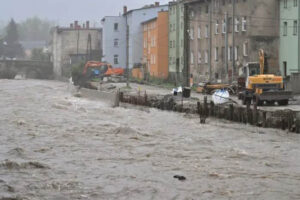
Railroad operators in the Czech Republic and Poland have temporarily canceled a number of flights due to flooding, including, according to Czech RegioJet, a temporary suspension of traffic on the section between Ostrava and Olomouc, Czech Republic, which is used by the company’s trains from Prague to Przemysl and Chop.
“We ask all passengers to postpone their current trips between Ostrava and Olomouc or Przeworów. We will inform you about further developments,” the company said on its website.
For its part, Ukrzaliznytsia clarified that as of now, both RegioJet trains from Prague to Chop and Przemysl are still in the Czech Republic and have no chance of catching their connecting Ukrainian flights.
“Therefore, we remind you that we are ready to accept passengers with tickets for today’s trains for any of our flights of the same destination in the next day to any available seats without exchanging tickets,” the Ukrainian railroad operator said.
As for passengers from Ukraine traveling to their connection in the Prague direction, Ukrzaliznytsia recommended contacting the Czech or Polish railway operator to clarify the schedule of the next flights.
“There is a high probability that passengers should plan to spend the night in the city of connection,” UZ said.
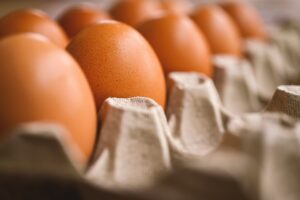
Polish egg producers welcome the reinstatement of customs duties on eggs imported to the European Union from Ukraine, as a few dozen hours were enough to increase interest in eggs from Polish farmers, said Pawel Podstawka, chairman of the National Federation of Poultry and Egg Producers (KFHDiPJ).
“For many weeks now, we have been observing a stagnation in purchase prices for eggs, which, due to the very low prices offered by competitors from Ukraine, our livestock producers had to sell almost at production cost. (…) According to the signals I receive from colleagues from different parts of the country, although only a few dozen hours have passed since the reintroduction of customs duties, there is already a visible recovery on the demand side, which proves the tendency towards market normalization,” he was quoted as saying by the Polish publication farmer.pl.
Pawel Luty, spokesman for Ferm Woźniak, the largest egg producer in Poland, agrees with the KRHDiPJ chairman.
“The introduction of customs duties on imports of eggs from Ukraine to the European Union brings the first positive effects for Polish egg producers and exporters. We are seeing increased interest from EU and third country counterparties in purchasing eggs from Poland. This is a step in the right direction, easing the pressure on local producers and strengthening their position on the international market. The egg market is still competitive, mainly on price, and the low standards of egg production in Ukraine and the associated lower production costs are a long-term problem. This is best illustrated by the export of egg powders, which Ukrainian producers offer at a price about 25% lower than the cost of raw materials required for the production of powders in the EU,” Luthi said.
According to the industry association, in 2023, egg production in Poland was estimated at about 14 billion eggs. Every tenth egg in Europe was laid in Polish chicken coops. Every third egg produced on Polish farms was exported.
As reported, from June 2, 2024, to June 5, 2025, the European Commission introduced quotas for the supply of eggs and sugar to the European Union from Ukraine due to the excess of quota-free volumes of their supplies to the European market.
Source: https://interfax.com.ua/
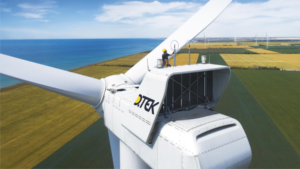
DTEK Energy Holding, through its EU-focused subsidiary DRI, has signed an agreement with Polish company Columbus Energy to build a 133 MW energy storage system in southern Poland.
“On March 27, DRI signed a definitive binding share purchase agreement with Polish company Columbus Energy, which will give it the right to build a 133 MW battery storage facility in southern Poland, subject to permits,” DTEK said in a release on its website on Wednesday.
DTEK notes that this is the largest energy storage system (ESS) project in Poland, and the agreement is its first major infrastructure investment in the country and a key element in the company’s plan to create a pan-European energy system uniting Ukraine and the EU. DTEK’s goal is to create a 5 GW portfolio of renewable energy projects in Europe by 2030 through DRI.
The acquisition of the 133 MW SPP project makes DTEK Group one of the first companies to develop this technology on a large scale in Poland, the release said.
DRI expects to close the deal with Columbus in the coming months and start construction of the facility in Q4 2024 to complete it and put it into operation in early 2026. The project is committed to providing energy capacity to the Polish market for 17 years (from 2027).
“Today’s signing marks an exciting moment in Europe’s quest to move beyond fossil fuels. This project will not only provide vital flexibility on Poland’s path to a renewable future, but will also be an important achievement for Central and Eastern Europe in demonstrating how battery storage can be successfully developed. DTEK’s investments in the country are a crucial step towards the integration of the energy systems of Ukraine and Poland,” said Maxim Timchenko, CEO of DTEK Group, as quoted in the release.
According to Krzysztof Kokhanowski, Vice President of the Board and CEO of PIME, the largest association in the energy storage industry in Poland, it is gratifying to see international energy players like DTEK investing in the Polish battery market through its EU subsidiary.
“Poland is one of the leaders in the European Union in the production of batteries and battery cells, and in the next 5 years it will be one of the leaders in the construction of energy storage facilities based on battery technology. The construction of this new facility will certainly contribute to our country’s efforts,” he said.
According to the release, Poland currently uses 30 GW of coal and natural gas-fired power to balance its energy system, which is increasingly using renewable energy sources and shifting from centralized to distributed generation. The batteries will help to ensure the grid’s performance and provide the power system with a reliable mechanism for balancing the unstable nature of renewable energy.
As reported, DTEK Group implemented a 1 MW pilot project in Enerhodar in 2021, before Russia’s full-scale invasion of Ukraine. It is now under occupation. In early 2024, DRI launched its first projects in Europe: in Romania, the 60 MW Ruginoasa wind farm and the 53 MW Glodeni solar power plant. It also intends to develop renewable energy in Romania, Italy, and Croatia.

Protesting Polish farmers have begun to restrict vehicle traffic on the border with Ukraine, the State Border Guard Service of Ukraine says.
“Medica-Shegyni. Polish farmers have completely blocked truck traffic through the checkpoint. No deadline for the completion of such a blockade was announced,” the State Border Guard Service said in a statement on its Telegram channel on Tuesday.
According to the State Border Guard Service, the protesters plan to block traffic for all types of transport near the Dolhobychuv-Uhryniv checkpoint until 17.00 on February 20.
“At the Zosin-Ustyluh checkpoint, from 13:00 to 16:00, the protesters intend to restrict the movement of buses, trucks and cars in both directions. They promise to let through only trucks with humanitarian aid,” the State Border Guard Service said in a statement.
At the Korchova-Krakovets checkpoint: “Until 21.00 on February 20, the protesters plan to block the movement of trucks leaving Poland, except for those carrying critical cargo. At the same time, buses, minibuses, and cars will be able to move freely in both directions.”
According to the State Border Guard Service, at the Hrebenne-Rava-Ruska checkpoint, “protesters have completely blocked traffic in both directions for all categories of vehicles, except for those carrying critical cargo and humanitarian aid, since 13.00 on February 20.”
At the Dorohusk-Yahodyn checkpoint, the protest organizers intend to completely block truck traffic in both directions until “19.00”.
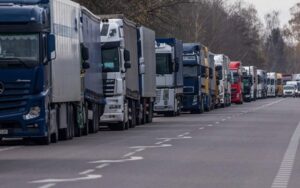
The Polish government is making efforts to effectively represent the interests of Polish carriers and drivers, which will lead to a weakening and, as a result, an end to the blockade on the Polish-Ukrainian border, Polish Prime Minister Donald Tusk said on Wednesday at a press conference after a government meeting.
“I don’t think we will achieve the maximum demanded by the Polish protesting carriers, but it seems that what can be achieved will allow us to defuse emotions and perhaps quickly lift the blockade on the border. I think we are close to believing that our actions can bring results – both actions in Kyiv and negotiations in Brussels,” he was quoted as saying by polskieradio24.pl.
Tusk also said that after the government meeting, a meeting of the Security Committee of the Council of Ministers was held, during which Foreign Minister Radoslaw Sikorski reported on his visit to Kyiv.
“It confirmed what we all know and feel, that the situation at the front is difficult,” the Prime Minister said.
He noted that “in general, the situation in Ukraine is quite dramatic for various reasons. This requires us to be very active, both in terms of diplomatic and political support, as well as strong cooperation in terms of material assistance to Ukraine,” Tusk emphasized.
As reported, Polish carriers began blockading the Yahodyn-Dorohusk, Krakovets-Korchova and Rava-Ruska-Krebenne checkpoints on November 6, and on November 22, the Oszukana Wieś organization joined the protest and blocked the Shehyni-Medyka checkpoint. Only the checkpoints for empty vehicles and those for light trucks remained outside the blockade.
On December 11 at 14:00 Kyiv time, the head of the Dorohuska Commune dissolved the protest of Polish carriers, and later refused to satisfy a new protest application. However, on December 15, a local Polish court overturned this decision, allowing the protesters to resume the blockade on December 18.
The organizers of the blockade, who demand the abolition of the “transport visa-free regime” for Ukraine introduced with the war, reported that, according to the official permission of the local authorities, it would last until January 3, 2024. However, some checkpoints already have permits to extend it until February, and a new blockade of the Dorohusk-Yagodyn checkpoint, according to Polish media, has been announced until March. The Ukrainian side had hoped for the border to be unblocked after the new government led by Donald Tusk came to power in Poland in mid-December, but so far, the blockade has been lifted only at the Shehyni-Medica checkpoint since December 25.
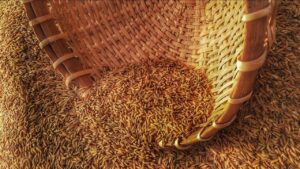
Poland’s actions regarding Ukrainian grain are wrong, unlawful and harmful for Polish, Ukrainian and all farmers in the European Union, said Taras Kachka, Deputy Minister of Economy and Trade Representative of Ukraine.
“Finally, Poland has told the truth about Ukrainian grain. It is not about this season, but about the conditions of Ukraine’s accession to the EU. This was very clearly stated by Minister of Agrarian Policy Telus,” he commented on Facebook about Poland’s unilateral extension of the embargo on Ukrainian agricultural exports.
The Ukrainian trade representative noted that in this way, “in fact, introductory negotiations on agriculture have begun” with “such aggressive combat intelligence and complete antagonism on the part of Poland.”
“In fact, Poland is fighting for a liberum veto in Ukraine without any explanation,” he wrote, and emphasized that Ukraine will stand by the fact that Poland’s actions regarding Ukrainian grain are wrong, unlawful and harmful to Polish, Ukrainian and all EU farmers.
A number of public figures joined the discussion of Poland’s political action under the auspices of the Ukrainian Trade Representative. In particular, Lukasz Adamski, vice director of the Meroszewski Center, pointed out that Ukraine’s unwillingness to integrate into the European Union is due to “a mental factor – the inability of Ukrainian officials to draw conclusions from the policy mechanisms that outline the policies of the EU and its states.”
He pointed out to the deputy minister that the emotional rhetoric is “objectively counterproductive” for Ukraine and creates the image of a state that “although in a very difficult situation, is not a member of the EU, but is only trying to enter (it – IF-U), and is already challenging its closest and most trusted ally in waging a war (trade – IF-U) and (…) blocking transit.”
“The simple emotional imposition of one’s position without the possibility of a normal conversation is the problem created by the agrarian bloc of the Polish government. With all due respect, I want a normal conversation. What is being proposed is to agree to agrarian subjugation because you need it. This is nonsense in any context,” Kachka countered.
Volodymyr Lapa, former head of the State Service of Ukraine for Food Safety and Consumer Protection, noted that the thesis that Ukrainian officials are unable to comprehend the mechanisms of EU policy when the EU is on Ukraine’s side in this matter seems “somewhat strange.”
“Rather, it is about Poland’s inability to adhere to the principles of the EU’s common policy if it contradicts the current political interests of local elites,” he stated.
Mykola Gorbachev, President of the Ukrainian Grain Association, thanked the Ukrainian Trade Representative for his position and cooperation and expressed confidence that after Ukraine wins, which Poland is helping, the issue will be resolved, as “open Ukrainian ports can solve the problem.”